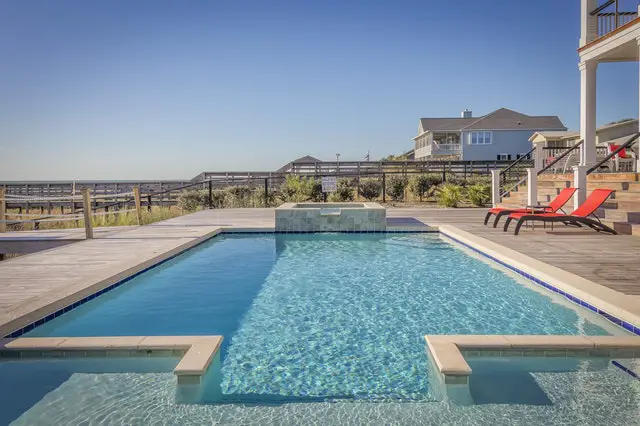One of the issues of owning a pool is how to keep it balanced and crystal clear. The use of chemicals such as chlorine seems to be the most viable choice, but it’s often pushed aside for a cheaper option, bleach. Is the alternative a good one however? Can it be used in the pool for disinfection and oxidation purposes?
You can use bleach in your pool, but any expert would recommend you use pool grade chlorine instead, due to the fact that it has a higher concentration of chlorine which means it works better. If you choose to use bleach, you’d have to keep an eye on the level of chlorine, and try to maintain the balance by yourself.
Apart from that, there are other disadvantages involved in using bleach on your pool, which I’ll further explain.
I mentioned chlorine earlier. Do people use chlorine? Why?
Chlorine is the most important, and effective chemical needed by anyone who owns a pool to ensure it’s clean, and free from dirt, chloramines and harmful microorganisms..
It’s actually known as Pool grade chlorine but people just call it chlorine
Chlorine works by destroying the outer membrane of micro organisms, making them inactive, and easier to just filter out, with the help of the pool’s filtration system.
It doesn’t just kill microorganisms, it also oxidizes other materials such as dirt and chloramines and to some extent, ensures that other water parameters are relatively stable. Failure to use chlorine would not only make harmful bacteria and algae to thrive, the chemical imbalance of the water could also damage some of the physical components of the pool.
If you don’t understand what I meant by chemical imbalance, just know that if a cleaner fails to use chlorine, the water could become “hard water“, which is very unsafe for swimming, and can lead to white residues on the ladder.
If chlorine is so essential as you explained, why are some people running away from it?
Well, there’s this scary phenomenon known as “Chlorine lock,” which I’ll explain further:
When you go to the store to buy chlorine for your pool, most shop keepers will advise you not to buy simple plain chlorine like I explained above, instead, they’ll advice you to buy small tablets of chlorine (they look like hockey pucks) combined with other chemicals.
The sun really degrades chlorine fast, so the chemicals help the chlorine last longer in the water, it also has some algaecide (chemicals for killing algae).
This may sound like a good thing but the chemicals prevent the chlorine from killing bacteria and algae as effective as it would if it were simple and plain. These chemicals are called stabilizers.
When you add the stabilized chlorine into the water, the chlorine breaks down just fine but the stabilizer doesn’t easily dissolve in water, you add more the next day, and the number of partially dissolved stabilizers increase until the pool inadvertently becomes saturated with these stabilizers.
It then reaches a stage where you add chlorine, and instead of it to start working, it gets acted on by the excess stabilizers, and since I said earlier that a “stabilized” chlorine isn’t as effective, the number of algae and harmful bacteria would increase.
When a pool owner is stuck in this cycle, the pool company will try to sell the person chemicals like “Clarifiers” which are quite expensive.
A lot of pool owners know, are scared of this scheme, and try to cut costs by using bleach instead. The downside is that they’ll have to keep an eye on the concentration of chlorine, as well as buy, regulate, and add stabilizers themselves to the bleach (don’t forget that stabilizers are important nonetheless)
Think of it as someone who thinks buying a plate of food in a restaurant is too expensive, so he proceeds to buy the ingredients to cook the food by himself; he gets to cut cost, but there’s the inconvenience involved in cooking the food, as well as the technicality.
Oh! And let me also remind you that bleach in itself is much cheaper than chlorine
Now that I’ve explained why people would use bleach instead of chlorine, it’s time to see which one is actually better from an objective standpoint.
Bleach vs Chlorine
Bleach is mainly chlorine, the difference between bleach and chlorine is the concentration.
Bleach is mostly water, with 5 percent chlorine and other extras like coloring and fragrance, which affects the effectiveness. Pool grade chlorine (often referred to as just “chlorine”) is between 65 to nearly 100 percent chlorine depending on the form it’s sold in. Gas chlorine has the highest concentration (as much as 100%), then solid before liquid chlorine.
This brief analogy should let you know that chlorine (pool grade chlorine to be exact) is more effective than bleach.
I said earlier that I’ll explain some of the disadvantages of using bleach instead of chlorine, so, here they are:
- It will cost you more:
I just confused you just now right? I said earlier that bleach is much cheaper than chlorine, but here I am saying it will cost you more. Let me explain;
The concept is very simple, bleach has an extremely low concentration of chlorine. This means, before you’ll be able to achieve the same disinfectant properties as pool grade chlorine, you’ll need a lot of bleach to build up the required concentration. One unit of bleach is less expensive than one unit of chlorine, but in the long run, you’d need multiple units of bleach to give you the same value as one unit of chlorine.
- Bleach has an extremely high pH:
On the pH scale, bleach measures at an outstanding value of 12. This means you’ll have to spend money balancing the pH level of your pool as the effectiveness of chlorine is adversely affected at higher PH. Too high pH also results in a cloudy water and scaling which is nothing but the precipitation of mineral components.
- If you don’t use bleach properly, it could irritate the eyes and skin of anyone swimming, it could even lead to breathing difficulty
- Bleach degrades much rapidly than chlorine under sunlight, due to its unstable nature, as a result, you’d have to use a much higher amount. This could be damaging, both health wise and economy wise.
- Prolonged usage of bleach leads to the appearance of scales at the bottom of the pool and on the ladder. It would also cause your water to become cloudy.
If you still choose to use bleach, what are some necessary precautions?
- Apply bleach in stages instead of all at once (this applies to anything else you want to add to your pool), and while you’re doing it, be sure to have your chlorine test kit available so that while you’re applying the bleach, you’re simultaneously checking the concentration. Note that while you’re checking it, keep it in mind that the concentration should be at least 1.0ppm at all times (stands for parts per million, which is the mass of a chemical per unit volume of water).
Also, if you’re using stabilizers, the concentration of chlorine should be at least 1.5ppm.
- Another great way to know how much bleach to add to your pool is to contact the pool owner for the dimensions of the pool. This would tell you the capacity of water the pool can take, and there’s actually a standard measurement for different capacities.
If you want to do it yourself, there’s a simple mathematical method:
Firstly, you calculate the volume of your pool (you’ll need the dimensions or measurements) which can be gotten by length X width X depth. Whatever you get, multiple it by 7.5 if it’s a rectangular pool, 6.7 if it’s an oval pool, and 5.9 if it’s a round pool, this should give you how many gallons of water your pool can hold.
- This one is very obvious but I’ll say it anyway; use the required protection such as gloves to minimize contact with skin. Wear goggles if possible to prevent it from getting into your eyes.
- Don’t be a chemist, never try to mix bleach with other cleaning products, they could contain ammonia, vinegar, alcohol, or hydrogen peroxide and when these mix with bleach, it releases chlorine gas which could actually kill you.
The concept of super chlorination
Have you ever had an experience where you were in the pool, and then suddenly your eyes started irritating you strongly, which made you suspect that the chlorine in the water could be excessive? This phenomenon is known as super chlorination.
What is super chlorination?
When you sweat or pee in a pool, those substances contain ammonia, which is a great source of nitrogen. The chlorine reacts with this to form chloramine, which gives out a very strong odor.
To control this, pool owners increase the chlorine residual (just call it chlorine concentration) 5 to 10 times its normal value. This is called super chlorination, and it completely oxidizes the chloramine.
Super chlorination should be done once a week in hot weather, and once a month in other weather conditions to control the formation of chloramines.
Speaking of eyes getting irritated, another factor that could affect how the water reacts with your eyes and skin is the pH of the water.
The pH is simply a measure of acidity, and alkalinity of the water. Not only does the pH affect how the water interacts with you, it can also affect how effectively your chlorine (or bleach) would kill microorganisms.
The standard pH for your pool should be 7.2 to 8.0.
If the pH starts getting low (acidic), to raise it back, you’ll need to add a pound of baking soda to raise the pH back to required measurement, and if the pH starts getting too high (alkaline), you could reduce it back to optimum pH by adding hydrochloric acid to a bucket of water and then pouring it into the pool.
The pH of the pool can be measured by a pH test kit.
Frequently Asked Questions
How long after adding bleach can I swim?
Ideally, you should wait for about 5hrs before its safe to take a dive.
Can you add bleach to a kiddies pool?
Yes, you can, but it would have to be in minute quantity. In fact, it’s best you add the amount you’d normally add in a spa tub to the kiddies pool.
Final Verdict
As stated in the article, you can add bleach to a swimming pool, but there are some things you’d need to take into account, like concentration, and the presence of stabilizers. If you get those covered, you’re pretty much good to go.

